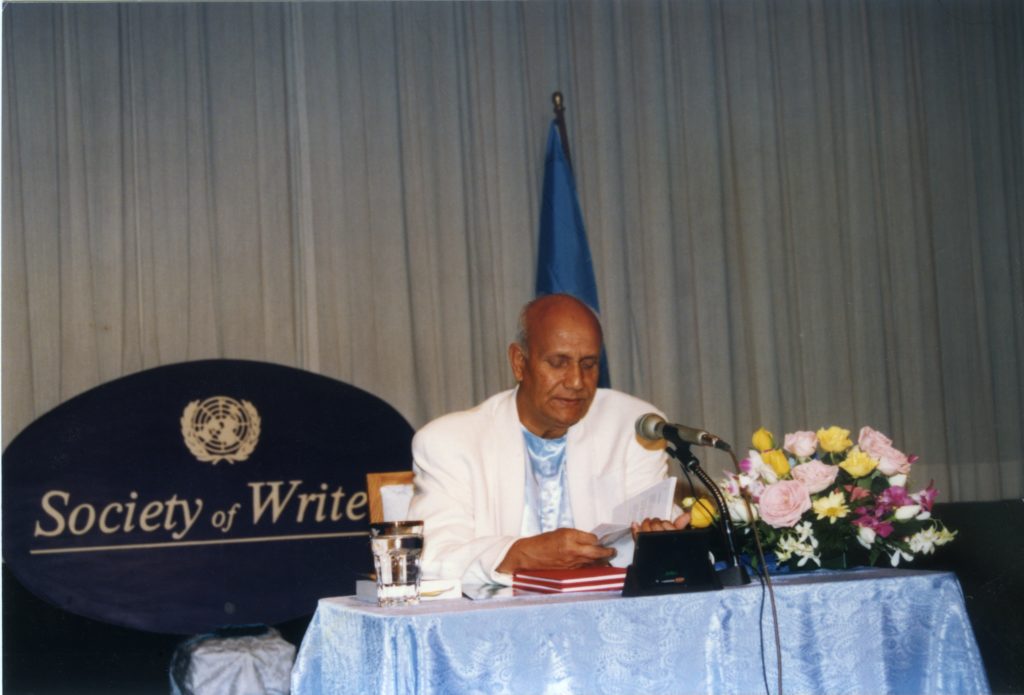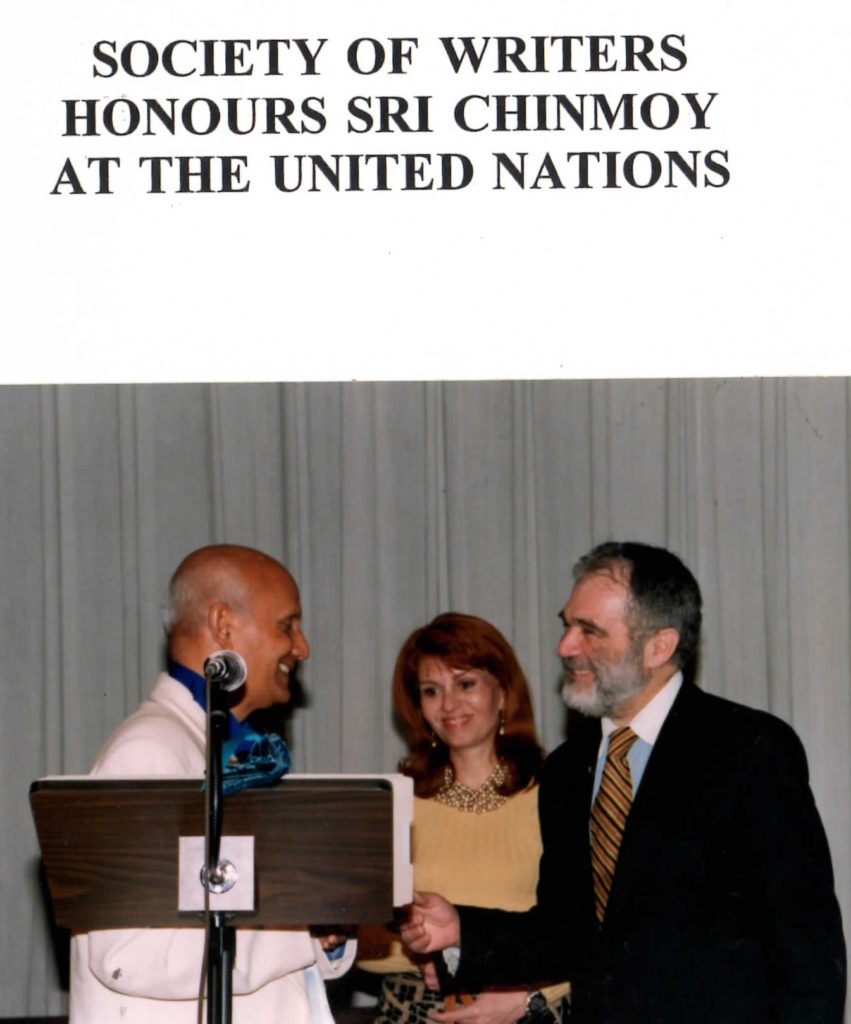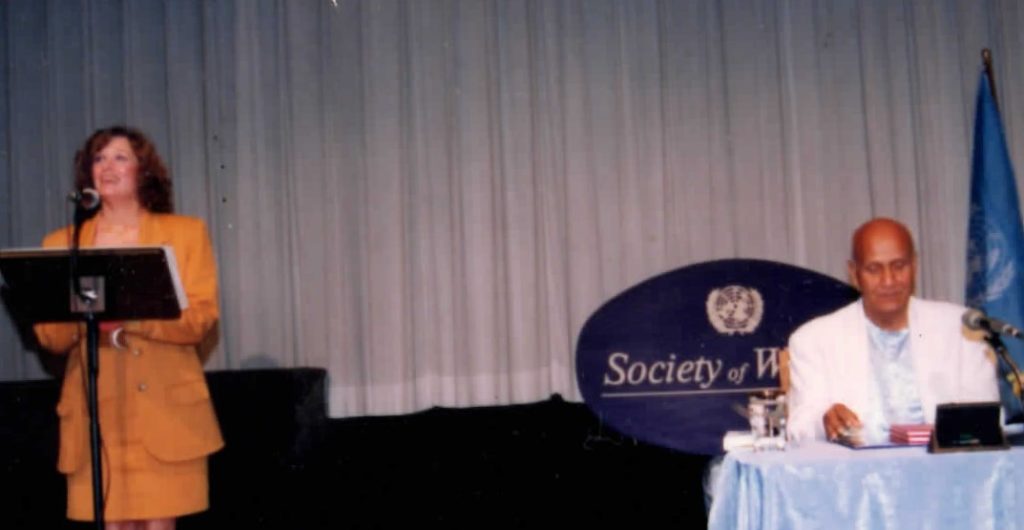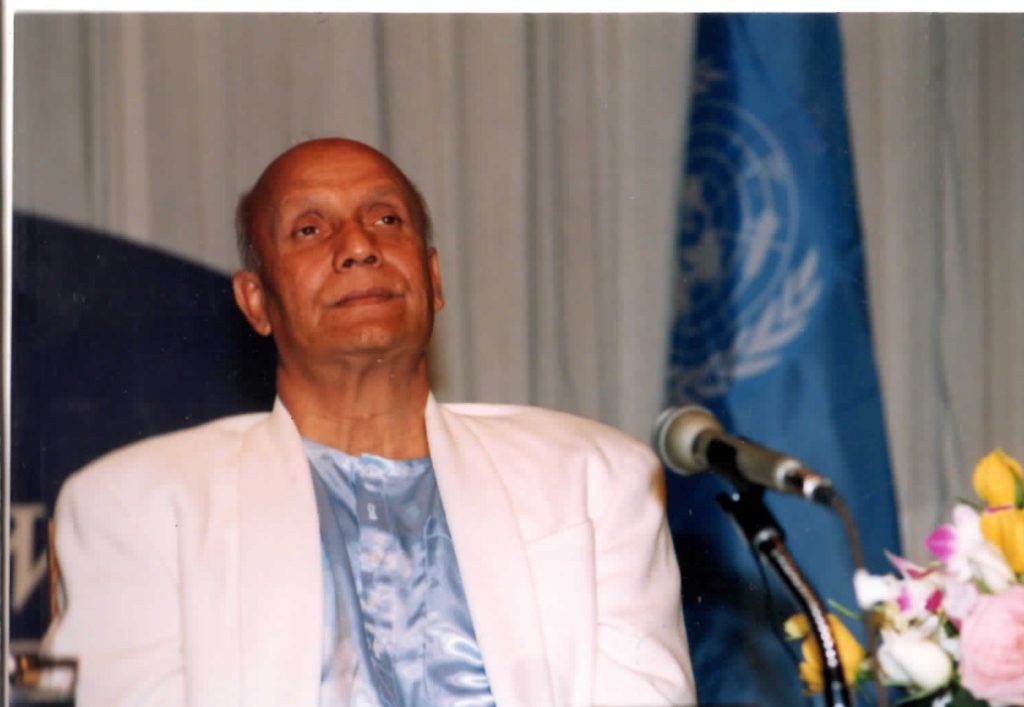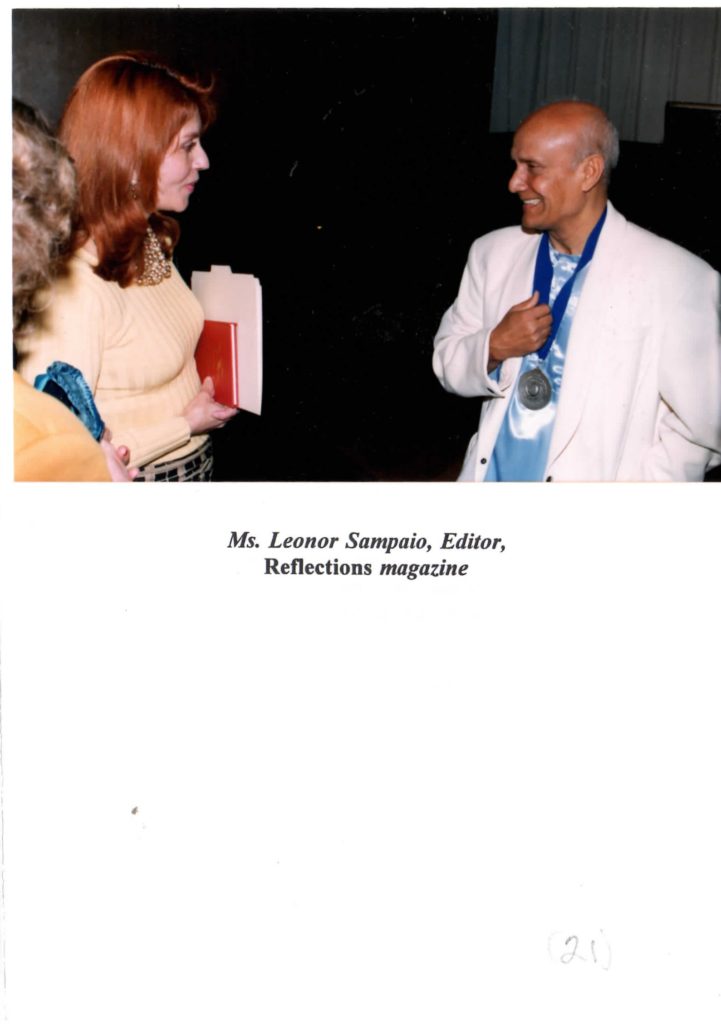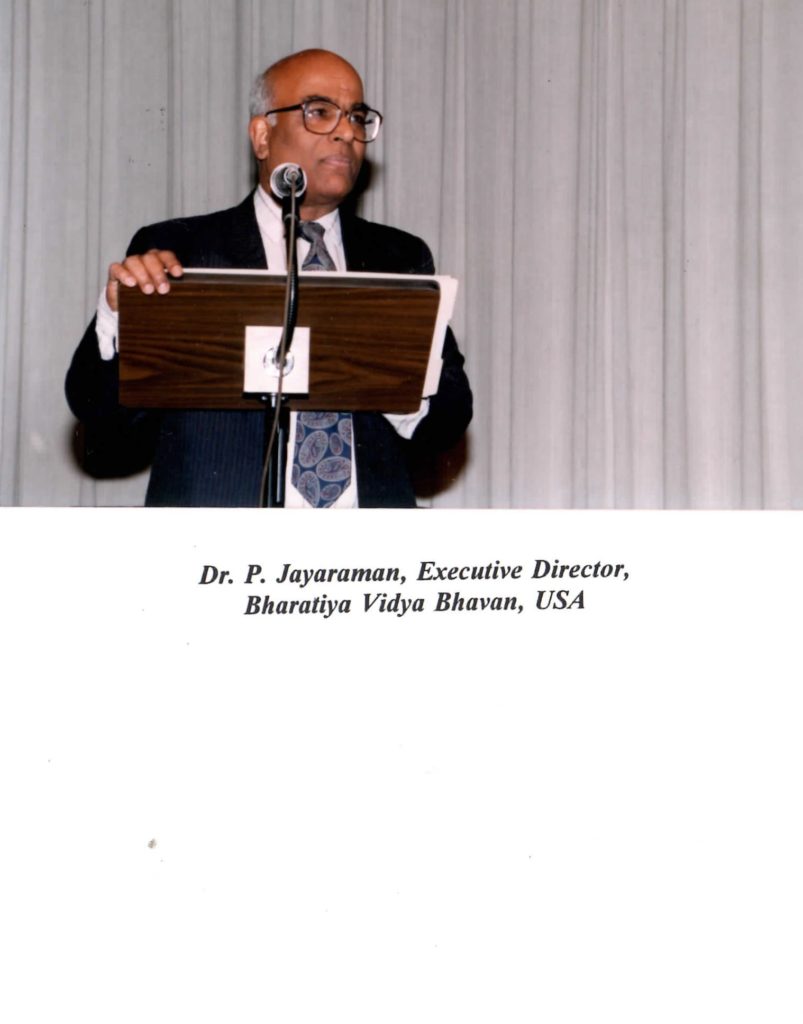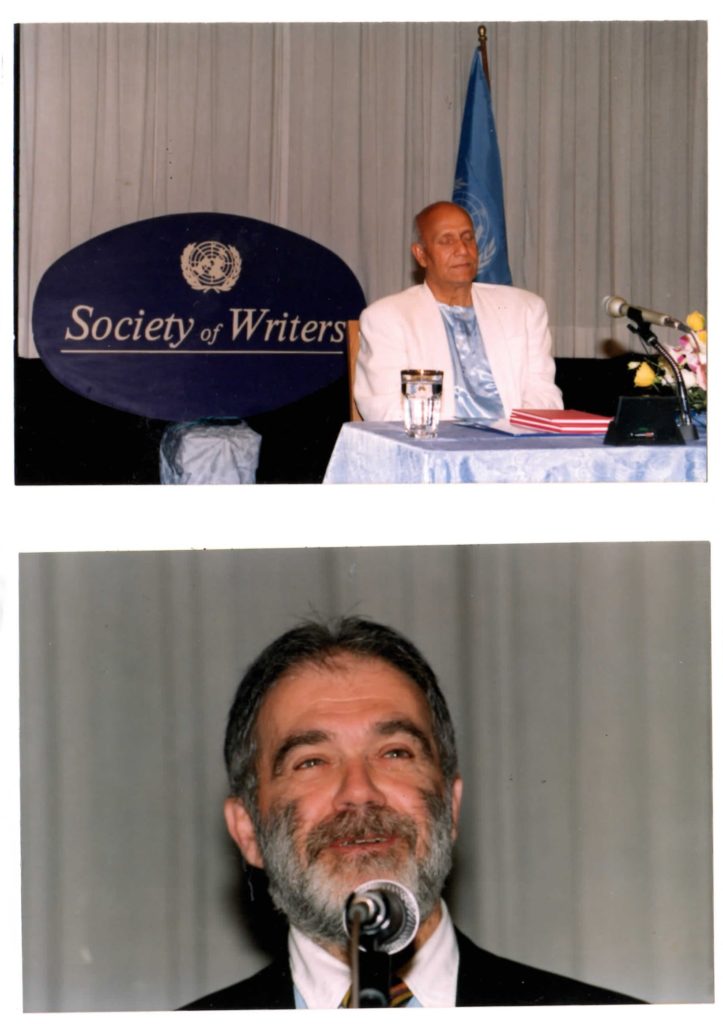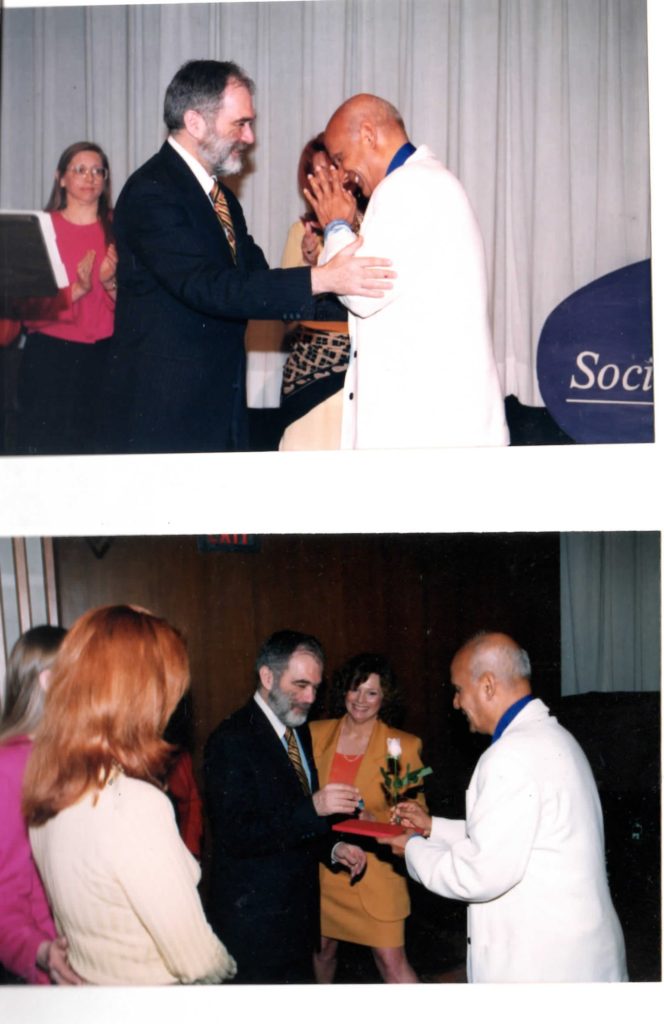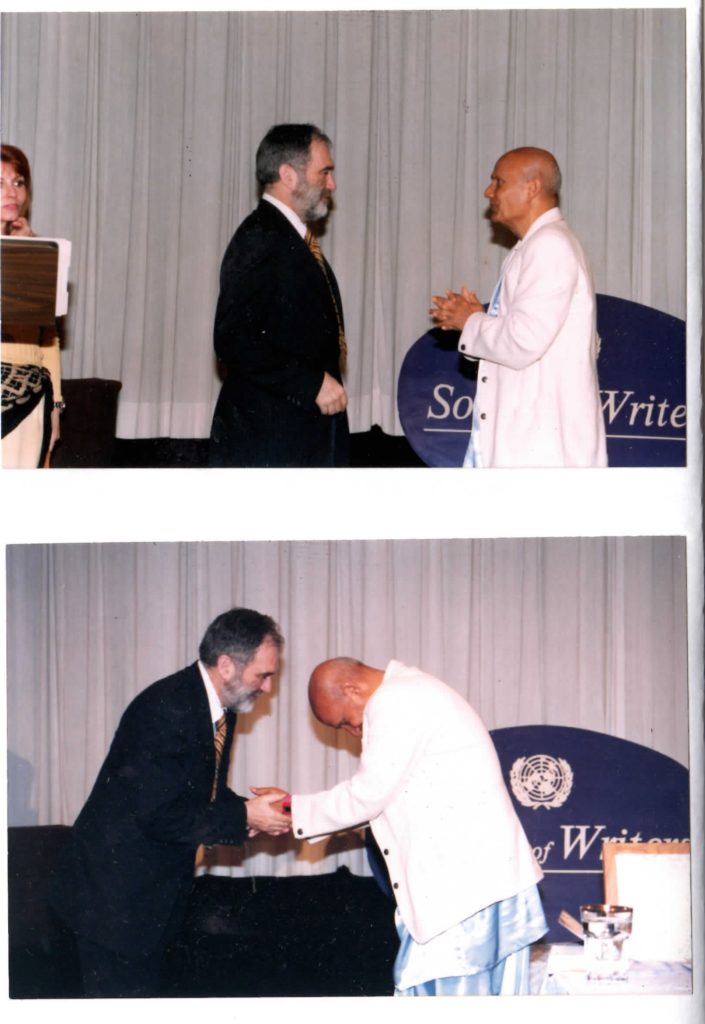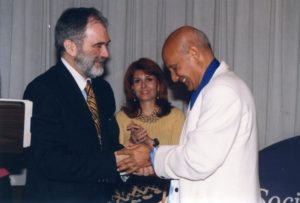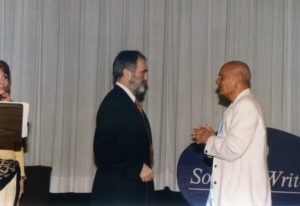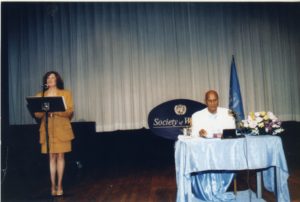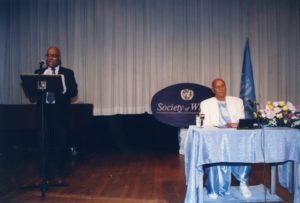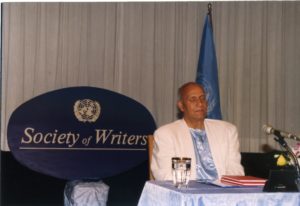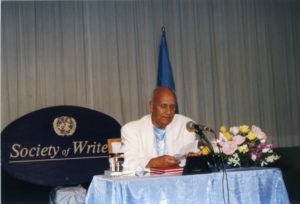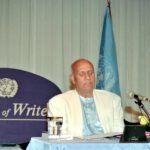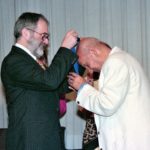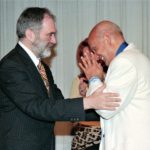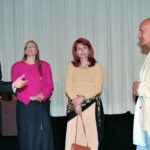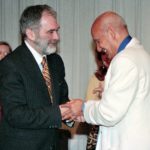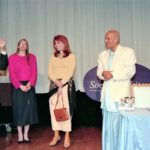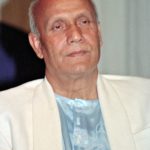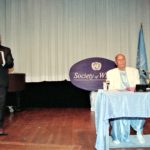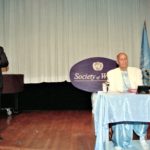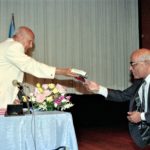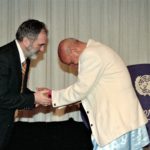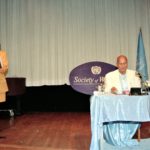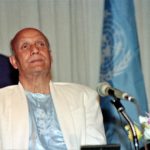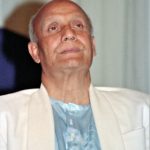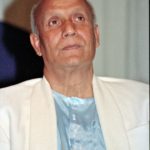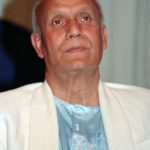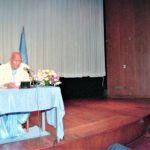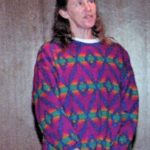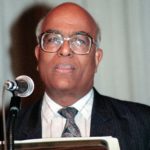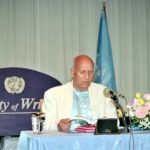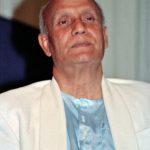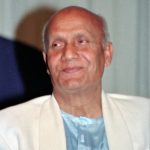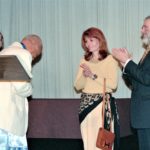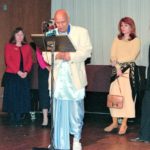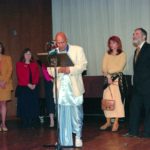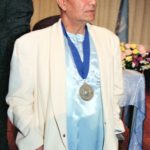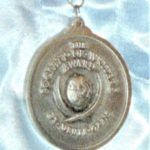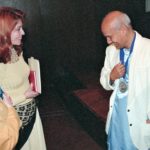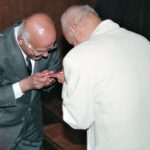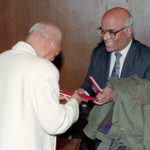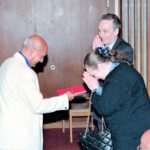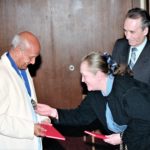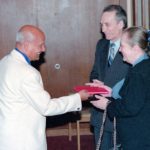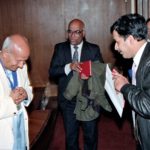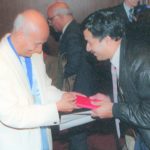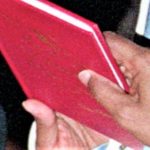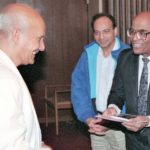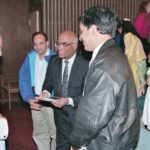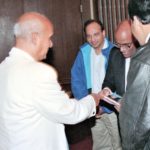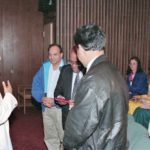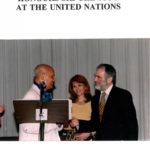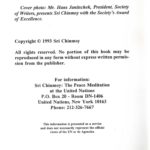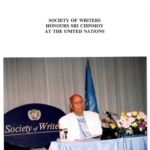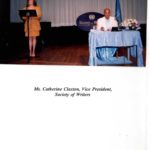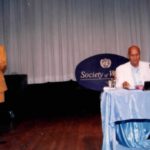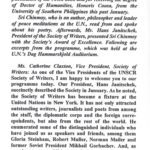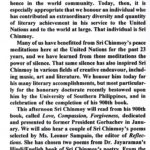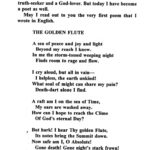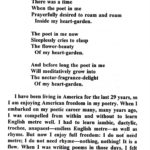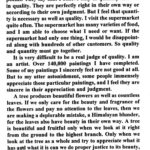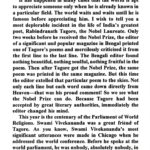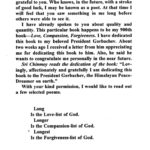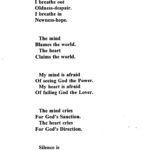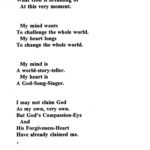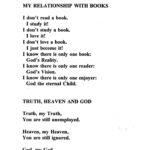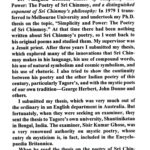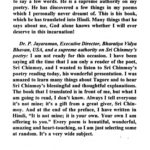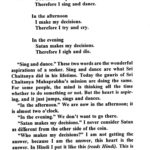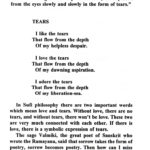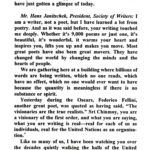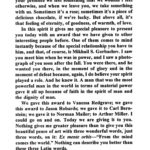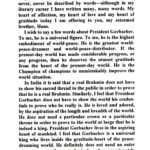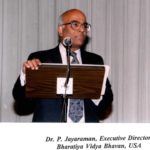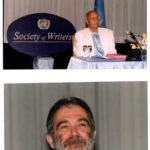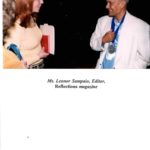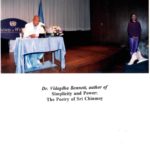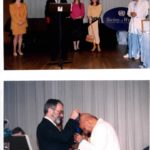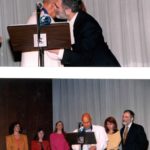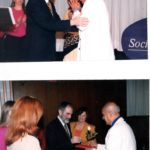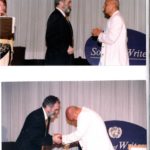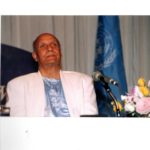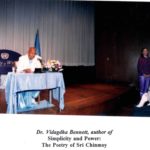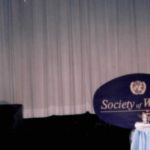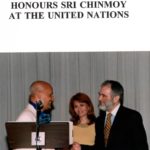Poetry by Sri Chinmoy; UNSRC Society of Writers Award of Excellence Mar 1993
Filed under MG Members in other events | Other Awards, Citations, Presentations | Poetry30 March 1993, Poetry reading by Sri Chinmoy, followed by a presentation by Mr. Hans Janitscheck, President of the UNSRC Society of Writers, to Sri Chinmoy of the Society’s Award of Excellence – UN Dag Hammarskjold Auditorium.
Sri Chinmoy recited some from his earliest days to more recent Poems.
Dr. Vidagdha Bennett spoke some about her thesis on Sri Chinmoy’s poetry and Ph.D. from Melbourne University in Australia.
Dr. P. Jayaraman, Executive Director, Bharatiya Vidya Bhavan, USA, is a authority on Sri Chinmoy’s poetry. He translated a selection into Hindi his book titled “Poems of Sri Chinmoy..
More text and photos to be posted as available
Cover photo: Mr. Hans Janitschek, President, Society of Writers, presents Sri Chinmoy with the Society’s Award of Excellence.
On 30 March 1993 the United Nations Staff Recreation Council Society of Writers honoured Sri Chinmoy for the publication of his 900th book andfor receiving the degree of Doctor of Humanities, Honoris Causa, from the University of Southern Philippines this past January.
Sri Chinmoy, who is an author, philosopher and leader of peace meditations at the U.N., read from and spoke about his poetry. Afterwards, Mr. Hans Janitschek, President of the Society of Writers, presented Sri Chinmoy with the Society’s Award of Excellence. Following are excerpts from the programme, which was held at the U.N. ‘s Dag Hammarskjold
Ms. Catherine Vijaya Claxton, Vice President, Society of Writers: As one of the Vice Presidents of the UNSCR Society of Writers, I am happy to welcome you to our programme today. Our President, Hans Janitschek, succinctly described the Society in January. As he noted, the Society of Writers has become a fixture at the United Nations in New York. It has not only attracted outstanding writers, journalists and poets from among the staff, the diplomatic corps and the foreign correspondents, but also from the rest of the world. He enumerated some of the distinguished individuals who have joined us as speakers and friends, among them Gloria Steinham, Robert Muller, Norman Mailer and former Soviet President Mikhail Gorbachev. And, as you know, we publish one of the rare international literary magazines, called Reflections, which has already found acceptance worldwide.
Above all, I think, we seek in the Society of Writers to reflect, encourage and appreciate the diversity of literary talent in the United Nations community, and hence in the world community. Today, then, it is especially appropriate that we honour an individual who has contributed an extraordinary diversity and quantity of literary achievement in his service to the United Nations and to the world at large. That individual is Sri Chinmoy.
Many of us have benefitted from Sri Chinmoy’s peace meditations here at the United Nations for the past 23 years, and we have learned from these meditations the power of silence. That same silence has also inspired Sri Chinmoy in various fields of creative endeavour, including music, art and literature. We honour him today for his many literary accomplishments, but most particularly for the honorary doctorate recently bestowed upon him by the University of Southern Philippines, and in celebration of the completion of his 900th book.
This afternoon Sri Chinmoy will read from his 900th book, called Love, Compassion, Forgiveness, dedicated and presented to former President Gorbachev in January. We will also hear a couple of Sri Chinmoy’s poems selected by Ms. Leonor Sampaio, the editor of Reflections. She has chosen two poems from Dr. Jayaraman’s Hindi/English book of Sri Chinmoy’s poetry. From the rich diversity of Sri Chinmoy’s writings, there is probably a special message for each person; it is always interesting to see what inspires or intrigues another individual, especially a friend, so I am looking forward to hearing Leonor’s choices.
At this time please join me in welcoming our honoured guest, Sri Chinmoy, while he shares with us some of his literary talents.
Sri Chinmoy: I do not know how I can possibly be worthy of this blessingful honour. I am known as a truth-seeker and a God-lover. But today I have become a poet as well.
May I read out to you the very first poem that I wrote in English.
THE GOLDEN FLUTE
A sea of peace and joy and light Beyond my reach I know.
In me the storm-tossed weeping night Finds room to rage and now.
I cry aloud, but all in vain— I helpless, the earth unkind!
What soul of might can share my pain? Death-dart alone I find.
A raft am I on the sea of Time, My oars are washed away.
How can I hope to reach the Clime Of God’s eternal Day?
But hark! I hear Thy golden Flute, Its notes bring the Summit down.
Now safe am I, O Absolute!
Gone death! Gone night’s stark frown!
So that was my very first attempt—over 40 years ago. And this particular poem that I am going to read out is only three hours old. You will see the difference. You can call it either my most deplorable degradation and say that I have gone “downhill,” or you can say that I have made progress in a different way.
There was a time
When the poet in me
Prayerfully desired to roam and roam Inside my heart-garden.
The poet in me now
Sleeplessly cries to clasp The flower-beauty
Of my heart-garden.
And before long the poet in me
Will meditatively grow into
The nectar-fragrance-delight Of my heart-garden.
I have been living in America for the last 29 years, so I am enjoying American freedom in my poetry. When I embarked on my poetic career many, many years ago, I was compelled from within and without to •learn English metre well. I had to learn iambic, dactylic, trochee, anapaest—endless English metre-—as well as rhyme. But now I enjoy full freedom: I do not need metre; I do not need rhyme—nothing, nothing! It is a now. When I was writing poems in those days, I felt that I was playing on the flute. Now when I write poems perhaps I am striking gongs or playing on the synthesizer. But I feel that light and power are inseparable. They are the obverse and reverse of the same universal reality.
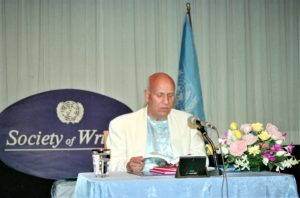 In my family, almost everybody has written poems. My father wrote about thirty poems; my two older brothers, one to a hundred; and my eldest brother, two or three thousand. I am the youngest and also, it seems, the most greedy. Over 50,000 poems go to my credit. My critics justifiably criticise me for having written so many poems. They say that I believe only in quantity and not in quality. They are perfectly right in their own way or according to their own judgment. But I feel that quantity is necessary as well as quality. I visit the supermarket quite often. The supermarket has many varieties of food, and I am able to choose what I need or want. If the supermarket had only one thing, I would be disappointed along with hundreds of other customers. So quality and quantity must go together.
In my family, almost everybody has written poems. My father wrote about thirty poems; my two older brothers, one to a hundred; and my eldest brother, two or three thousand. I am the youngest and also, it seems, the most greedy. Over 50,000 poems go to my credit. My critics justifiably criticise me for having written so many poems. They say that I believe only in quantity and not in quality. They are perfectly right in their own way or according to their own judgment. But I feel that quantity is necessary as well as quality. I visit the supermarket quite often. The supermarket has many varieties of food, and I am able to choose what I need or want. If the supermarket had only one thing, I would be disappointed along with hundreds of other customers. So quality and quantity must go together.
It is very difficult to be a real judge of quality. I am an artist. Over 140,000 paintings I have completed. Some of my paintings I sincerely feel are not good at all. But to my utter astonishment, some people immensely appreciate those particular paintings, and I feel they are sincere in their appreciation and judgment.
A tree produces beautiful flowers as well as countless leaves. If we only care for the beauty and fragrance of the flowers and pay no attention to the leaves, then we are making a deplorable mistake, a Himalayan blunder, for the leaves also have beauty in their own way. A tree is beautiful and fruitful only when we look at it right from the ground to the highest branch. Only when we look at the tree as a whole and try to appreciate what it has and what it is can we do proper justice to its beauty, its compassion and its perfection.
I am extremely grateful to this distinguished Writers’ Society for bestowing upon me this signal honour at a time of my life when I am not as well known in the world of poetry as in the world of truth-seekers and peace-servers. People know me as a student of peace, as a truth-seeker, a God-lover and a world-server. But here my friends and colleagues have found an entire sun inside some of the climbing, aspiring poetic names I have created. And for that I am extremely, extremely grateful to them.
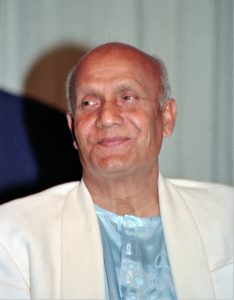
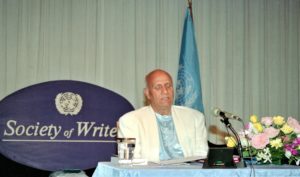 It has happened in many cases that the world is apt to appreciate someone only when he is already known in a particular field. The world waits and waits until he is famous before appreciating him. I wish to tell you a most deplorable incident in the life of India’s greatest poet, Rabindranath Tagore, the Nobel Laureate. Only two weeks before he received the Nobel Prize, the editor of a significant and popular magazine in Bengal printed one of Tagore’s poems and mercilessly criticised it from the first line to the last line. The Bengali editor found nothing beautiful, nothing soulful, nothing fruitful in the poem. Then after Tagore got the Nobel Prize, the same poem was printed in the same magazine. But this time the editor extolled that particular poem to the skies. Not only each line but each word came down directly from Heaven—that was his proud comment! So we see what the Nobel Prize can do. Because Tagore had been accepted by great literary authorities, immediately the editor changed his mind.
It has happened in many cases that the world is apt to appreciate someone only when he is already known in a particular field. The world waits and waits until he is famous before appreciating him. I wish to tell you a most deplorable incident in the life of India’s greatest poet, Rabindranath Tagore, the Nobel Laureate. Only two weeks before he received the Nobel Prize, the editor of a significant and popular magazine in Bengal printed one of Tagore’s poems and mercilessly criticised it from the first line to the last line. The Bengali editor found nothing beautiful, nothing soulful, nothing fruitful in the poem. Then after Tagore got the Nobel Prize, the same poem was printed in the same magazine. But this time the editor extolled that particular poem to the skies. Not only each line but each word came down directly from Heaven—that was his proud comment! So we see what the Nobel Prize can do. Because Tagore had been accepted by great literary authorities, immediately the editor changed his mind.
This year is the centenary of the Parliament of World Religions. Swami Vivekananda was a great friend- of Tagore. As you know, Swami Vivekananda’s most significant utterances were made in Chicago when he addressed the world conference. Before he spoke at the world parliament, he was nobody, absolutely nobody, in India. But after he became famous overnight in America, immediately Bengal and the entire India accepted him.
Unfortunately, only when the outer world or some well-established authority praises someone or justifiably acknowledges his merit is everybody else apt to appreciate that person. Although I am not known as a poet, still you are recognising the poet in me. For that I am deeply grateful to you. Who knows, in the future, with a stroke of good luck, I may be known as a poet. At that time I will feel that you saw something in me long before others were able to see it.
I have already spoken to you about quality and quantity. This particular book happens to be my 900th book—Love, Compassion, Forgiveness. I have dedicated this book to my beloved President Gorbachev. About two weeks ago I received a letter from him appreciating me for dedicating this book to him. Also, he said he wants to congratulate me personally in the near future.
Sri Chinmoy reads the dedication of the book: “Lovingly, affectionately and gratefully I am dedicating this book to the President Gorbachev, the Himalayan Peace Dreamer on earth.”
With your kind permission, I would like to read out a few selected poems.
Long
Is the Love-list of God.
Longer
Is the Compassion-list of God.
Longest
Is the Forgiveness-list of God.
Doubt is a sin
Of the mind.
Faith is a virtue
Of the heart.
I breathe out
Oldness-despair.
I breathe in
Newness-hope.
The mind
Blames the world.
The heart
Claims the world.
My mind is afraid
Of seeing God the Power.
My heart is afraid
Of failing God the Lover.
The mind cries
For God’s Sanction.
The heart cries
For God’s Direction.
Silence is
Eternity’s Choice.
Sound is
Infinity’s Voice.
My mind does not
Care to know
What God is doing
At this very moment.
My heart is dying
To know
What God is dreaming of
At this very moment.
My mind wants
To challenge the whole world.
My heart longs
To change the whole world.
My mind is
A world-story-teller.
My heart is
A God-Song-Singer.
I may not claim God
As my own, very own.
But God’s Compassion-Eye
And
His Forgiveness-Heart
Have already claimed me.
When I soulfully
Love God,
He asks me to claim His myriad Dreams
As my own, very own.
Now I am gratefully reading out the two poems selected by the editor of Reflections, Ms. Leonor Sampaio, from Dr. Jayaraman’s book, Poems of Sri Chinmoy.
MY RELATIONSHIP WITH BOOKS
I don’t read a book.
I study it!
I don’t study a book.
I love it!
I don’t love a book.
I just become it!
I know there is only one book:
God’s Reality.
I know there is only one reader:
God’s Vision.
I know there is only one enjoyer: God the eternal Child.
TRUTH, HEAVEN AND GOD
Truth, my Truth,
You are still unemployed.
Heaven, my Heaven,
You are still ignored.
God, my God,
You are still unsought.
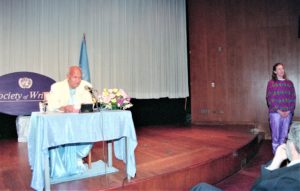
Now with your kind permission I would like to introduce two individuals to you. Dr. Vidagdha Bennett wrote her thesis on my poetry and received her Ph.D. from Melbourne University in Australia.
Dr. Vidagdha Bennett, author of Simplicity and Power: The Poetry of Sri Chinmoy, and a distinguished exponent of Sri Chinmoy’s philosophy: In 1979 1 transferred to Melbourne University and undertook my Ph.D. thesis on the topic, “Simplicity and Power: The Poetry of Sri Chinmoy.” At that time there had been nothing written about Sri Chinmoy’s poetry, so I went back to his original poems and studied them. My supervisor was a Jesuit priest. After three years I submitted my thesis, which explored many of the innovations that Sri Chinmoy makes in his language, his use of compound words, his use of natural symbolism and cosmic symbolism, and his use of rhetoric. I also tried to show the continuity between his poetry and the other Indian poetry of this century, particularly Tagore’s, and with the mystic poets of our own tradition—George Herbert, John Donne and others.
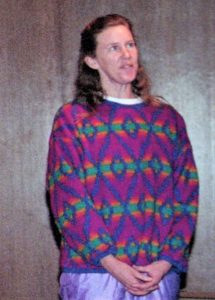 I submitted my thesis, which was very much out of the ordinary in an English department in Australia. But fortunately, when they were seeking an examiner, they sent the thesis to Tagore’s own university, Shantiniketan in Bengal, India. The examiner, Sisir Kumar Ghose, was a very renowned authority on mystic poetry, whose entry mysticism is, in fact, included in the Encyclopaedia Britannica.
I submitted my thesis, which was very much out of the ordinary in an English department in Australia. But fortunately, when they were seeking an examiner, they sent the thesis to Tagore’s own university, Shantiniketan in Bengal, India. The examiner, Sisir Kumar Ghose, was a very renowned authority on mystic poetry, whose entry mysticism is, in fact, included in the Encyclopaedia Britannica.
When he read the thesis on the poetry of Sri Chinmoy, he recognised that I was talking about a little boy that he had once known in India in the ashram of Sri Aurobindo. And the little boy that he had known at that time had now become a mature spiritual poet. Many months later I received the answer that the thesis had passed. It was the pioneer thesis on Sri Chinmoy’s poetry.
Sri Chinmoy: Now I wish to invite Dr. Jayaraman-ji to say a few words. He is a supreme authority on my poetry. He has discovered a few things in my poems which I personally never dreamt of. This is his book, which he has translated into Hindi. Many things that he says about me, God alone knows whether I will ever deserve in this incarnation!
Dr. P. Jayaraman, Executive Director, Bharatiya Vidya Bhavan, USA, and a supreme authority on Sri Chinmoy’s poetry: I am not ready for this occasion. I have been saying all the time that I am only a reader of the poet, Sri Chinmoy, and I wanted to listen to Sri Chinmoy’s poetry reading today, his wonderful presentation. I was amazed to learn many things about Tagore and to hear Sri Chinmoy’s blessingful and thoughtful explanations. The book that I translated is in front of me, but what I am going to read, I don’t know. Always I tell everyone it’s not mine; it’s a gift from a great giver, Sri Chinmoy. And at the end of the preface, I have written in Hindi, “It is not mine; it is your own. Your own I am offering to you.” Every poem is beautiful, wonderful, amazing and heart-touching, so I am just selecting some at random. It’s a very wide subject.
WHO MAKES MY DECISIONS
Who makes my decisions?
In the morning
God makes my decisions.
Therefore I sing and dance.
In the afternoon
I make my decisions.
Therefore I try and cry.
In the evening
Satan makes my decisions. Therefore I sigh and die.
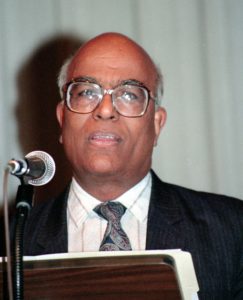 “Sing and dance.” These two words are the wonderful aspirations of a seeker. Sing and dance are what Sri Chaitanya did in his lifetime. Today the gauris of Sri Chaitanya Mahaprabhu’s mission are doing the same. For some people, the mind is thinking all the time whether to do something or not. But the heart is aspiring, and it just jumps, sings and dances.
“Sing and dance.” These two words are the wonderful aspirations of a seeker. Sing and dance are what Sri Chaitanya did in his lifetime. Today the gauris of Sri Chaitanya Mahaprabhu’s mission are doing the same. For some people, the mind is thinking all the time whether to do something or not. But the heart is aspiring, and it just jumps, sings and dances.
“In the afternoon.” We are now in the afternoon; it is almost two o’clock.
“In the evening.” We don’t want to go there.
“Satan makes my decisions.” I never consider Satan as different from the other side of the coin.
“Who makes my decisions?” I am not getting the answer, because I am the answer, this heart is the answer. In Hindi I put it like this (reads Hindi). This is a beautiful presentation of the inner heart’s feelings and the life’s ambitions and goal. The goal actually is returned in whatever form it takes.
One more poem I will read because I am very fond of this poetry. All the poems are like tears because tears come out in the form of poetry. If you don’t have sentiments, the tears will not come. The tears are presented through the poetry.
There was a great Hindi poet who said, “Poetry flows from the eyes slowly and slowly in the form of tears.”
TEARS
I like the tears
That now from the depth Of my helpless despair.
I love the tears
That flow from the depth
Of my dawning aspiration.
I adore the tears
That flow from the depth Of my liberation-sea.
In Sufi philosophy there are two important words which mean love and tears. Without love, there are no tears, and without tears, there won’t be love. These two are very much connected with each other. If there is love, there is a symbolic expression of tears.
The sage Valmiki, the great poet of Sanskrit who wrote the Ramayana, said that sorrow takes the form of poetry, sorrow becomes poetry. Then how can I miss adoring the tears which present the poetry, which present love? (Reads poem in Hindi.)
This is beautiful poetry. We live this poetry. Thank you.
Ms. Catherine Claxton: That was a nice, unexpected pleasure to have two scholars talking about some very wonderful poetry. I would like now to invite Mr. Hans Janitschek, the President of the Society of Writers, and the other members of our Executive Board to make a little presentation in appreciation for the talent that we have just gotten a glimpse of today.
Mr. Hans Janitschek, President, Society of Writers: I am a writer, not a poet, but I have learned a lot from poetry. And as it was said before, your writing touched me deeply. Whether it’s 9,000 poems or just one, it’s beautiful, it’s wonderful, it warms your heart and inspires you, lifts you up and makes you move. Most great poets have also been great movers. They have changed the world by changing the minds and the hearts of people.
We are gathering here at a building where billions of words are being written, which no one reads, which have no effect, which no one would ever want to have because the quantity is meaningless if there is no substance or spirit.
Yesterday during the Oscars, Federico Fellini, another great poet, was quoted as having said, “The visionaries are the true realists.” Sri Chinmoy, you are a visionary of the first order, and what you are saying, what you are writing is real—real for each of us as individuals, real for the United Nations as an organisation.
Like so many of us, I have been watching you over the decades quietly walking the halls of the United Nations. I never heard you say as many words as you have said today. I have heard you play instruments, but above all I have felt your presence. And that’s poetry of the highest order because what poetry does, as again was stated, is convey feelings. Again, Federico Fellini said that last night: “The message is the feeling.” The message is hard to describe without feelings, and this is why the presence of a great man, a holy man to many, changes the picture. In your presence, things change. In your presence we feel something that we wouldn’t feel otherwise, and when we leave you, we take something with us. Sometimes it’s a rose; sometimes it’s a piece of delicious chocolate, if we’re lucky. But above all, it’s that feeling of eternity, of goodness, of warmth, of love.
In this spirit it gives me special pleasure to present you today with an award that we have given to other interesting people before. One of them comes to mind instantly because of the special relationship you have to him, and that, of course, is Mikhail S. Gorbachev. I saw you meet him when he was in power, and I saw a photograph of you soon after the fall. You were there, and he wanted you there, in the moment of glory and in the moment of defeat because, again, I do believe your spirit played a role. And he knew it. A man that was the most powerful man in the world in terms of material power gave it all up because of faith in the spirit of man and the dignity of man.
We gave this award to Vanessa Redgrave; we gave this award to Jason Robards; we gave it to Carl Bernstein; we gave it to Norman Mailer; to Arthur Miller. I could go on and on. Today we are giving it to you. Nothing gives me greater pleasure than to give you this beautiful peace of art with three wonderful words, just three words, on it: Ex mente the mind comes the world.” Nothing can describe you better than these three Latin words.
Sri Chinmoy: My most esteemed brother-friend Hans, your blessingful honour-gift I shall treasure in the inmost recesses of my gratitude-heart. As you have observed me, even so I have observed you lovingly, affectionately and admiringly for many, many years. Your kindness, your wisdom and your self-giving can only be felt in the depth of my aspiring heart and can never, never be described by words—although in my literary career I have written many, many words. My heart of affection, my heart of love and my heart of gratitude today I am offering to you, my esteemed brother, Hans.
I wish to say a few words about President Gorbachev. To me, he is a universal figure. To me, he is the highest embodiment of world-peace. He is the greatest world peace-dreamer and world-peace-distributor. If the present-day world has made considerable progress, or any progress, then he deserves the utmost gratitude from the heart of the present-day world. He is the Champion of champions to unmistakably improve the world situation.
In India it is said that a real Brahmin does not have to show his sacred thread to the public in order to prove that he is a real Brahmin. Similarly, I feel that President Gorbachev does not have to show the world his credentials to prove who he really is. He is loved and adored, by the aspiration of the length and breadth of the world. He does not need a particular crown or a particular throne in order to prove to the world at large that he is indeed a king. President Gorbachev lives in the aspiring heart of mankind. I feel that Gorbachev is a universal king who lives inside the gratitude-heart of the peace dreaming world. He definitely does not need an outer crown, an outer throne, to lovingly and compassionately guide the evolution of humanity. His inner achievements are so enormous that they can perfectly lead and guide us to our supreme destination, the Golden Shore. For him, peace is not a mere dictionary word. In him, peace is a living reality, a sleepless and all-illumining reality that lovingly and self-givingly inspires the mind and feeds the heart of humanity.
…
Society of Writers Honours Sri Chinmoy at the United Nations – Booklet documents text and some photos from 30 March 1993 event in Dag Hammarskjold Auditorium at the UN. The text of Sri Chinmoy talk, poems and comments from this event also appear in Book “Poetry: My Rainbow-Heart-Dreams”, Agni Press, 1993. https://www.srichinmoylibrary.com/prh-2e1
Cover photo: Mr. Hans Janitschek, President, Society of Writers, presents Sri Chinmoy with the Society’s Award of Excellence.
Copyright © 1993 Sri Cbinmoy
This information is presented as a service and does not necessarily represent the official views of the UN or it s Agencies.
Gallery:
- ny301-1993-mar-30-CKG-Hans-Janitscheck-Pres.-of-UNSRC-Society-of-Writers
- ny302-1993-mar-30-CKG-Hans-Janitscheck-Pres.-of-UNSRC-Society-of-Writers
Gallery 2:
- R
Gallery 3:
Gallery 4:
(after Meditation, with Dr. P. Jayaraman, Executive Director, Bharatiya Vidya Bhavan, USA and friends.)
- 1993-03-29-09-3-Dr. Jayaraman, Vidya Bhavan
PDF of Booklet:
MS Word Text from scan of Booklet
Gallery 4 (from Publication):
- 1993-03mar-30-soc-writers-at-un-honour-sri-chinmoy-book-cover
- 1993-03mar-30-soc-writers-at-un-honour-sri-chinmoy-book-i.
- 1993-03mar-30-soc-writers-at-un-honour-sri-chinmoy-book-ii
- 1993-03mar-30-soc-writers-at-un-honour-sri-chinmoy-book-iii
- 1993-03mar-30-soc-writers-at-un-honour-sri-chinmoy-v-claxton-intro.
- 1993-03mar-30-soc-writers-at-un-honour-sri-chinmoy-book-p01
- 1993-03mar-30-soc-writers-at-un-honour-sri-chinmoy-book-p02
- 1993-03mar-30-soc-writers-at-un-honour-sri-chinmoy-book-p03
- 1993-03mar-30-soc-writers-at-un-honour-sri-chinmoy-book-p04
- 1993-03mar-30-soc-writers-at-un-honour-sri-chinmoy-book-p05.j
- 1993-03mar-30-soc-writers-at-un-honour-sri-chinmoy-book-p06
- 1993-03mar-30-soc-writers-at-un-honour-sri-chinmoy-book-p07
- 1993-03mar-30-soc-writers-at-un-honour-sri-chinmoy-book-p08.
- 1993-03mar-30-soc-writers-at-un-honour-sri-chinmoy-book-p09
- 1993-03mar-30-soc-writers-at-un-honour-sri-chinmoy-book-p10
- 1993-03mar-30-soc-writers-at-un-honour-sri-chinmoy-book-p11
- 1993-03mar-30-soc-writers-at-un-honour-sri-chinmoy-book-p12
- 1993-03mar-30-soc-writers-at-un-honour-sri-chinmoy-book-p13
- 1993-03mar-30-soc-writers-at-un-honour-sri-chinmoy-book-p14
- 993-03mar-30-soc-writers-at-un-honour-sri-chinmoy-book-p15
- 1993-03mar-30-soc-writers-at-un-honour-sri-chinmoy-book-p16
- 1993-03mar-30-soc-writers-at-un-honour-sri-chinmoy-book-p17
- 1993-03mar-30-soc-writers-at-un-honour-sri-chinmoy-book-p18
- 1993-03mar-30-soc-writers-at-un-honour-sri-chinmoy-book-p19
- 1993-03mar-30-soc-writers-at-un-honour-sri-chinmoy-book-p20
- 1993-03mar-30-soc-writers-at-un-honour-sri-chinmoy-book-p21
- 1993-03mar-30-soc-writers-at-un-honour-sri-chinmoy-book-p22.j
- 1993-03mar-30-soc-writers-at-un-honour-sri-chinmoy-book-p23.
- 1993-03mar-30-soc-writers-at-un-honour-sri-chinmoy-book-p24.
- 1993-03mar-30-soc-writers-at-un-honour-sri-chinmoy-book-p25
- 1993-03mar-30-soc-writers-at-un-honour-sri-chinmoy-book-p26
- 1993-03mar-30-soc-writers-at-un-honour-sri-chinmoy-book-p27.
- 993-03mar-30-soc-writers-at-un-honour-sri-chinmoy-booklet_scan_Page_12-v-bennett
- 1993-03mar-30-soc-writers-at-un-honour-sri-chinmoy-v-claxton-intro-crp
- 1993-03mar-30-soc-writers-at-un-honour-sri-chinmoy-booklet-cover-HJ-Presents.
